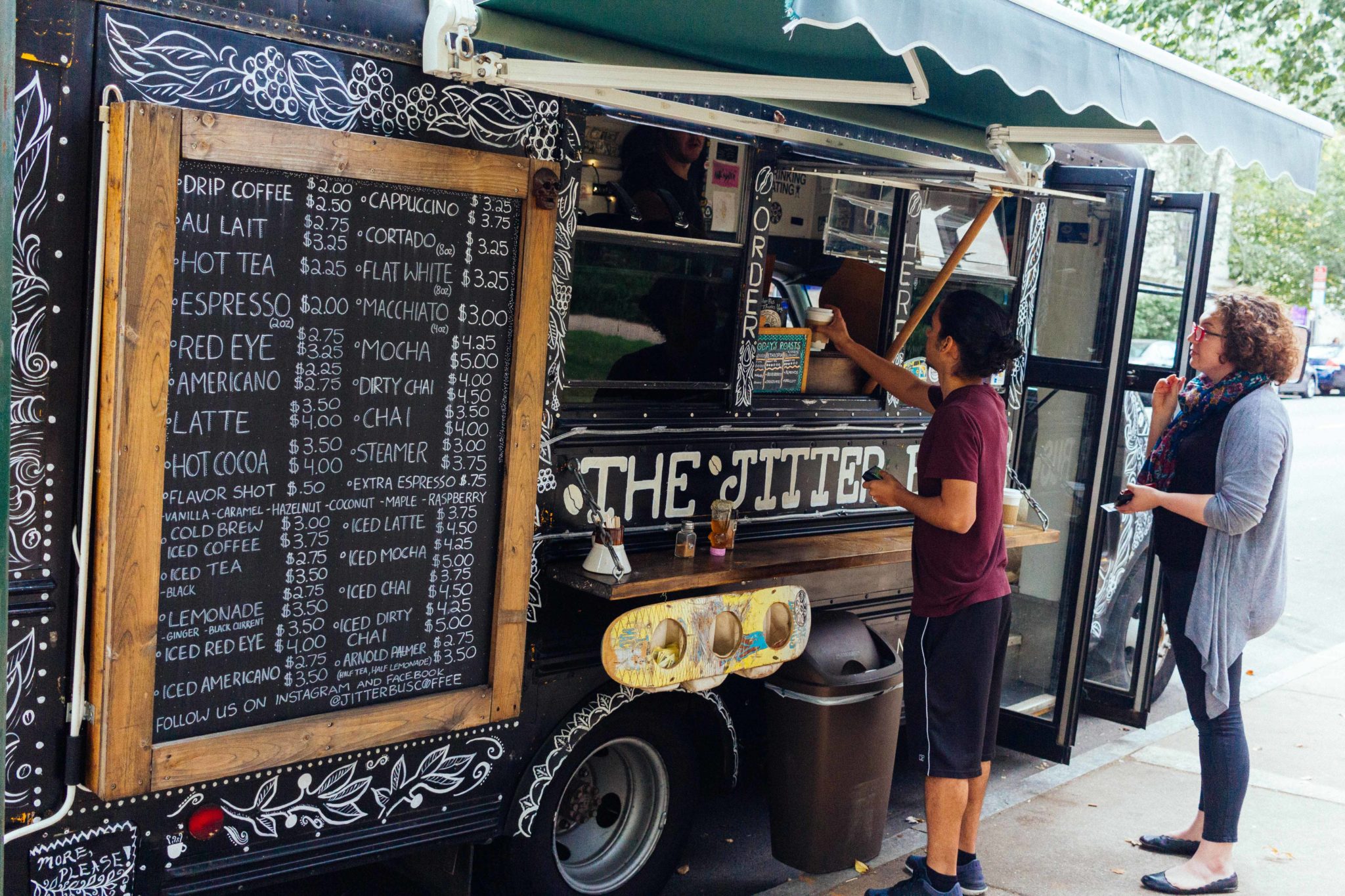
It is 2:15pm on a Monday afternoon. A hundred and seventy students stream out of one of Yale’s largest lecture halls, Sheffield-Sterling-Strathcona (SSS) 114 after one hour of Neuroscience 160: The Human Brain. A small contingent promptly makes its way to a black school bus, drawn over with white paint, reminiscent of chalk on middle school playgrounds.
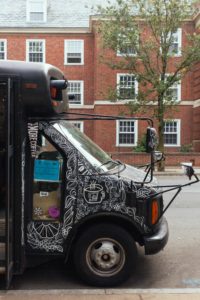
The Jitter Bus, a mobile cafe operating from a black van, is staidly parked at its usual spot, on Grove Street sandwiched between the gates of Silliman college and ‘America’s most beautiful street,’ Hillhouse Avenue. Our assemblage of sleep deprived Neuroscience students lines up to meet the Bus’ founding partners. In a few minutes, these students continue on their paths, satiated and awakened by Drip Coffee staples and concoctions like the Red Eye, coffee with an espresso shot in it, and Chaider, a mix of milk, chai and apple cider. It would be hard to imagine that these baristas, at one time, couldn’t even hold onto their jobs at Starbucks.
“Starbucks was my first job when I was 18 and they fired me within a month.They told me I was not cut out for it,” Dan Barletta said, “so a few years later I started this.” Today, Dan is one third of the trio running The Jitter Bus, New Haven’s only mobile café. With partners Paul Crosby and Andrew Mesiouris, he serves coffee to hundreds of sleepy students and tired academics each week at the intersection of Grove Street and Hillhouse Avenue.
A retrofitted school bus serving coffee on a college campus holds a certain charm for millennials. “While I was ordering coffee from The Jitter Bus a tour group of high school students walked down Hillhouse and I felt like the quintessential Cool Urban College Student (CUCS),” Robbie Short. ’19 joked. Isa del Toro Mijares ’20 was also attracted to the Bus’ design and atmosphere. “I related to the pennant which says, ‘Drink More Coffee’ at an existential level,” she laughed. Felicia Chang ’20 was attracted to the DIY skateboard, remodelled to hold sugar and condiments.
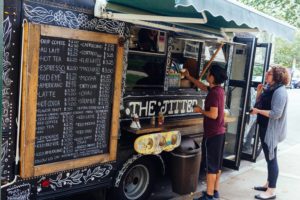
The idea for a mobile café initially came to Paul in August 2014. While walking down a street he noticed an ice cream truck and thought, “I wish I could buy coffee from an ice cream truck because I don’t want ice cream anymore, I’d really much rather have a coffee.” The name, The Jitter Bus, came soon after. “I don’t know why we picked that name, it was a play on words, it was punny,” he said, referring to a name partially inspired by the form of swing dance, partially by numerous songs, and entirely symbolizing the spontaneity and vivaciousness of the entity to which it lends its name.
“We got our first boost when we bought an espresso machine from Pure Health Lounge, a smoothie shop on Audubon Street which recently went under,” Paul said. The machine was sold to them for half its market price and Andrew promptly christened it Greta. “He has a habit of naming things after old women,” Dan laughed. Greta now resides in the warm confines of The Jitter Bus.

The next step was building the actual Jitter Bus. “We tried to get a loan from a bank but they weren’t sure of what we wanted to do and didn’t think that we were serious enough,” Dan said, “we were very young and didn’t have credit histories.” So, they turned their entrepreneurial skills to a Kickstarter campaign. The page created in February 2015 offers a unique glimpse into the founding principles of Jitter Bus, which remain fundamentally unchanged — a commitment to affordability, quality and Fair Trade, a social movement aiming to help producers in developing countries achieve better trading conditions. Their Kickstarter profile encapsulated their motivations. On their page they wrote, “many people have less, and we’re not the kind of folks that forget that.” Andrew, Dan and Paul raised $5,260 in 30 days from 43 backers including family, friends and complete strangers.
The Jitter Bus itself started its life as a school bus. The trio found it on Craigslist and bought it off a woman who had planned on making it a mobile woodworking shop. While they initially planned on hiring contractors to convert the school bus into a coffee van, they realized that this would be too expensive.
Faced with a challenge once again, Paul, Dan and Andrew sought solutions in cyberspace. “We decided to watch a bunch of YouTube videos and figure it out as we went along. It took a little longer but it was far cheaper to do it that way,” Dan said. Andrew and Paul drew on their experience in the plumbing and carpentry industries. The trio alluded to their business acumen in their Kickstarter page, “every purchase [we’ve made] has been painstakingly researched and aggressively haggled down. We really haven’t wasted a dime, and already have managed to save thousands.” From February to December 2015, while managing their own full-time jobs, the three put the Jitter Bus together one part at a time.
As baristas themselves, the founders had closely witnessed the failings of the local coffee industry, and wanted to set out to better them. “Especially in New Haven if you have a good location it doesn’t matter if you are selling good coffee or just dirt in a cup,” Dan lamented. He believes some cafes invest more in their ambiance and atmosphere over their products. “But they do give off this vibe that they care a lot. So, people get tricked into buying what they think is a good product but the quality is actually terrible,” he added.
The Jitter Bus took the first step to prioritize their product by choosing exactly where their coffee came from. “We picked two local roasters in Connecticut and we don’t use any coffee that is not organic or Fair Trade,” Dan said. They made their choice after a long and arduous search process. Even before they had a bus, they visited Saccuzzo Coffee, a roastery in Newington, Connecticut. They also met Jeff, the owner of Giv Coffee in Canton, Connecticut, who started out of his garage but now has his own café. Ultimately the founders decided to go with both suppliers. “They were both so good, it was impossible to choose,” Dan said with a smile.
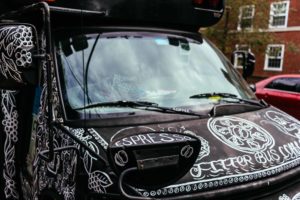
With its home and coffee ready, The Jitter Bus started operations in the early months of 2016.
The going was tough in the first few weeks. The trio faced a harsh winter, an unknown name, uncertain locations and a saturated coffee market in New Haven. “We started on Church Street in the dead of the winter. We didn’t have a reputation yet and we were selling coffee from an unmarked black van, so it seemed very sketch,” Paul recalled. Having built their own van, they also faced engine failures and lost revenue.
Having a mobile café also meant finding good locations on a daily basis. “The original plan was to drive around to different spots throughout the day. But we found that we had more business if we stuck to one spot because people knew where to find us and we built up regulars,” Dan explained. The Jitter Bus’ mobility was also affected by changing food truck regulations in the City of New Haven. The ordinance, approved by the Board of Alders in April 2017 and effective from July this year, reorganized the city into four new Special Vending Districts: Long Wharf Drive, Downtown, Cedar Street by Yale-New Haven Hospital, and Sachem Street by Ingalls Rink.
“Under the old system we paid a $200 licensing fee for the year and another $200 for a health inspector,” Dan explained. However, they were not guaranteed a spot and had to pay the parking meter every hour. Furthermore, there is a two-hour parking limit so they “either had the choice of moving three or four hundred feet every two hours or taking a ticket.” According to Paul, “every day we got a $20 parking ticket and we’d have to pay on the meter which cost $17 more.” At one point, The Jitter Bus had amassed $400 in parking fines.
The Jitter Bus was also always at risk of losing its preferred spot at the corner of Grove Street and Hillhouse Avenue to another vendor. They once faced such competition from Café Romeo, which also used to operate a mobile café. “Café Romeo once parked at our spot for two weeks because they knew it worked. And we had no legal rights to tell them to move,” Paul recounted. The situation was resolved when Andrew, a former employee of Café Romeo, spoke to the manager.
Dan prefers the new food truck regulations which give Jitter Bus the exclusive rights to its spot, reducing the risk of another vendor taking it, and removing parking costs and fines. However, having the right to a spot also means The Jitter Bus is no longer as mobile. “If we want to move to another spot we will have to swap licenses with another vendor, and that’s difficult,” he said. “For us it is not so much of a problem since we had narrowed down our business strategy to sticking to one location anyhow, but I can see how other vendors may want the mobility of the old system.”
With an expanding Yale College, which will be adding three hundred students every year till 2020, and a strong following amongst staff, faculty and locals, the future for The Jitter Bus looks bright. Having more than recouped their initial investments, the trio are now considering expanding to a brick and mortar café, indicative of how far they have come in a short span of time. “One year ago to this day, we would not even have considered this because the money wasn’t there. Now we have a steady flow of business coming in and it seems attainable,” Dan said. He hopes to set up a stage for local artists and to launch a wider breakfast menu. Paul however, has some apprehensions. “I don’t mind staying small because quality is my biggest priority. A lot of coffee firms scale too fast and hire people who don’t know what they are doing,” he said. Paul devoutly avoids Blue State Coffee, a staple for many Yale students. “Some my friends worked for Blue State and were not treated well,” he said. However, he supports Jitter Bus’ expansion, “The café would be a good idea to make more money, give employment to people who need it and expand what we are doing — ethically sourcing coffee and making a great product.”
Some students will welcome a brick and mortar Jitter Bus. “I have a philosophical difference with the concept of a coffee bus. When I get coffee, it is an experience — I go into a coffee shop for hours. I am not there to just drink coffee but also be in the social space to get work done,” Robbie said.
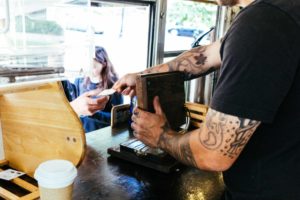
“They just seemed like very nice people,” Isa said, who first tried The Jitter Bus upon a recommendation from a suitemate. “And I was surprised by how fast it was. Getting coffee in Blue State is a 10-minute-long affair but here I had my drink in literally 3 minutes,” she remarked.
The partners are, after all, essentially family. Dan, Andrew and Paul all hail from West Haven and have known each other since the early days of high school. Their bond has become one of Jitter Bus’ unique selling points. “I watched the three work in a small space, crafting drinks and organizing items while chatting with customers, and was hand-delivered my mocha by Paul seconds after crafting it right in front of me,” Yelp reviewer Brigit C noted. Sean R., another Yelp user, agreed. “These three guys put themselves into creating and sustaining The Jitter Bus and it shows,” he said in his review.
“We were best friends before we started the business,” Dan said, “I know there is a saying ‘Don’t ever go into business with your friends,’ but the three of us have an idea of what we want collectively and we make it work. Sometimes we want to kill each other but that’s true with any business partnership.” He remembers an argument from their early days of operation, over the purchase of Greta. “She was discounted but still very expensive. The two of us were saying that we should wait and have some money before we make a purchase like that but the other guy went ahead and bought it anyway,” Dan said. He conceded that the quarrel was insignificant in the larger scheme of things.
Initially, the founders continued to work part time to make ends meet. But business has grown in the past two years and now they devote their entire time to the enterprise. “Jitter Bus gave me a sense of purpose. I was confused what to do as a career…I would pick one thing and decide it was not for me. Once we started doing this I started to feel like I knew what I was doing,” Dan recollected. After starting The Jitter Bus, Dan switched his major from psychology to business and is now finishing his bachelor’s degree at Southern Connecticut State University. “I don’t get much sleep with a full-time job and college but I have an unlimited supply of caffeine,” he said with a smile.
Surbhi Bharadwaj | surbhi.bharadwaj@yale.edu







